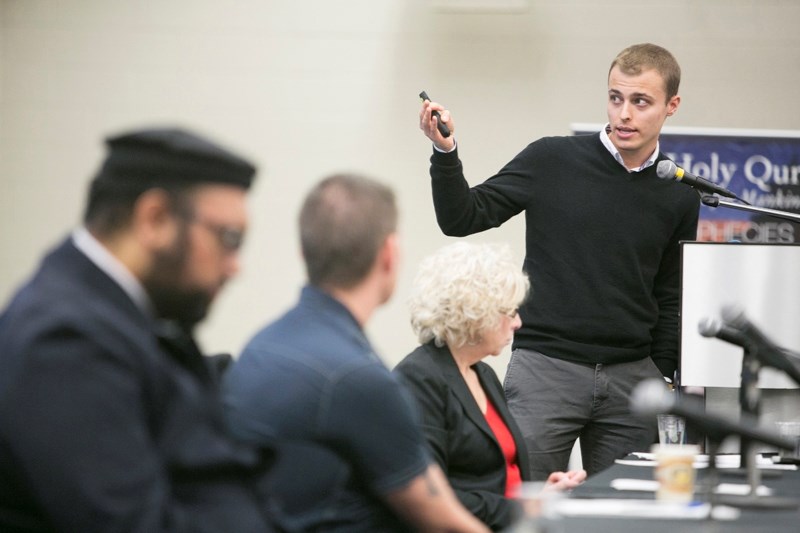Does God exist?
Two of three speakers at the ninth annual World Religions Conference in the Alumni Centre Wednesday were convinced that He does.
However, one was not.
Brayden Whitlock, a director of the Society of Edmonton Atheists, said he's virtually certain there is no god, but he can't be 100 per cent certain.
He compared the question to “is there a unicorn in your kitchen?”
Whitlock said unicorns are mythical creatures said to possess magical powers. Because he was away from home, Whitlock said he can't be 100 per cent certain there was no unicorn in his kitchen, but he couldn't completely rule that possibility out. He said the same applies to whether God – also said to have magical powers -- exists.
Rev. Rick Braaksma, a Calgary pastor representing Christianity, and Maulana Shahrukh Abid, a Calgary imam representing Islam, told the audience of about 100 people they're convinced God does exist.
Braaksma said he personally has experienced God, although he stressed, “I don't have a red phone in my office with direct access to God.” Neither, he said, does he have the addresses of “heavenly beings.”
But that doesn't sway him from his belief in the existence of God.
Braaksma said although there may be no direct proof that God exists, the fact that we, the world, nature, and the universe are here, proves the existence of God.
He said science can explain how things operate; for example, how nature works or the effect gravity has on people and objects. But it can't explain how the universe came into being.
Scientists say the universe was created by “the big bang,” in which matter was blown apart, creating the stars and planets we have in the universe today. But who or what created the conditions that enabled the big bang to occur?
Similar questions prove the existence of God, Braaksma said.
“Why is it (the world) rational and not irrational?” he asked. “Why is mathematics true?”
Shahrukh Abid voiced a similar argument, saying the universe is perfect, without “the slightest fault in the system.”
He said the prophets prove the existence of God because at the time they lived, they relayed things that only God could have known.
For example, Abid said about 1,400 years ago, one prophet predicted the discovery of fingerprints that could be used to solve crimes. However, the key role fingerprints could play in solving crimes wasn't actually discovered until the 1800s.
“It was knowledge that was given to him by someone who knew everything,” Abid said, implying that someone had to be God.
The event lasted about two hours.
During a question-and-answer period, Brayden was peppered with the vast majority of questions as people challenged his beliefs. (Questions were written on pieces of paper handed out during the meeting).
For example, Whitlock was asked how he handles questions of morality and values if not for religion and a belief in God.
“Morality is a tricky word,” he said. “It's very subjective.”
He said although there are some “wonderful things” in the Qur'an (the Islamic equivalent of the Bible), if read literally, they are considered to be quite brutal by some people.
Whitlock noted that as a result, those people say they don't take the Qur'an's word on such issues literally. By doing so, he said, they're using their own moral compass, just as he does.
Whitlock said he's not going to live his life from the world of “some old book.”
Whitlock was asked who created him.
“My mom and dad,” he answered, hinting he doubted they did so “by some holy command.”
A few questions were directed to Braaksma.
For example, it was pointed out that during his arguments, Braaksma did not mention Jesus Christ, despite the fact that Christianity is based on his teachings and the word is derived from his name.
Two people invited to speak did not make it. They are Miriam Fry, representing Judaism and Tina Fox, representing aboriginal spirituality.
Moderator Heather Henderson-Hill thanked the crowd for “not judging.”
The conference was organized by Ahmadiyya Muslim Jama'at Canada, a sect of Islam.



